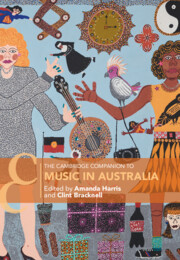Book contents
- The Cambridge Companion to Music in Australia
- Cambridge Companions to Music
- The Cambridge Companion to Music in Australia
- Copyright page
- Dedication
- Contents
- Figures
- Maps
- Tables
- Music Examples
- Contributors
- Acknowledgements
- 1 Introduction and Historiography of Music in Australia
- Part I Continuities
- 2 How Yolŋu Songs Recount Deep Histories of International Trade across the Arafura Sea
- 3 Torres Strait Islander Musics: Tradition, Travel and Change
- 4 Singing Country in the Land Now Known as Australia
- 5 The Spiritual in Australia: Practices, Discourse and Transformations, 1879–1950
- Part II Encounters
- Part III Diversities
- Part IV Institutions
- Index
- References
4 - Singing Country in the Land Now Known as Australia
from Part I - Continuities
Published online by Cambridge University Press: 14 November 2024
- The Cambridge Companion to Music in Australia
- Cambridge Companions to Music
- The Cambridge Companion to Music in Australia
- Copyright page
- Dedication
- Contents
- Figures
- Maps
- Tables
- Music Examples
- Contributors
- Acknowledgements
- 1 Introduction and Historiography of Music in Australia
- Part I Continuities
- 2 How Yolŋu Songs Recount Deep Histories of International Trade across the Arafura Sea
- 3 Torres Strait Islander Musics: Tradition, Travel and Change
- 4 Singing Country in the Land Now Known as Australia
- 5 The Spiritual in Australia: Practices, Discourse and Transformations, 1879–1950
- Part II Encounters
- Part III Diversities
- Part IV Institutions
- Index
- References
Summary
This chapter considers practices of Indigenous language singing in the place now known as Australia, framing it as both an overt act of resistance to settler-colonisation and key to the maintenance of reciprocal Indigenous relationships with landscapes. In response to deliberate and sustained government attempts to diminish the use of hundreds of Indigenous languages, song has emerged as core to Indigenous language revitalization efforts. Renewed interest in Indigenous songs has also motivated increasing numbers of Indigenous community-directed ethnomusicology studies involving the repatriation of audio recordings. In describing the dynamic intersection of popular music and Indigenous song forms since the mid twentieth century, this chapter draws links to longstanding Indigenous practices of sharing songs across vast geographic and cultural boundaries. Discussing the inherent complexity of revitalizing, maintaining, and innovating within Indigenous traditions, the authors emphasise the relational nature of song and the inherent responsibilities singers carry.
Keywords
- Type
- Chapter
- Information
- The Cambridge Companion to Music in Australia , pp. 56 - 71Publisher: Cambridge University PressPrint publication year: 2024

